 |
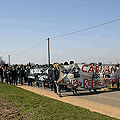
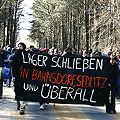
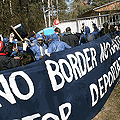
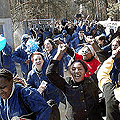
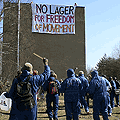
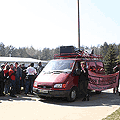
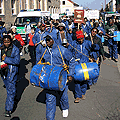
|
 |
 |
Action tour against Europe’s camp system
www.nolager.de  31.
Juli 2005 31.
Juli 2005
For freedom of movement and equal rights for everyone – 24th/25th
of septemer 2005
Everywhere around the globe people are fighting against camps, partly from
the inside, partly from the outside. We will pick up this issue on September
24./25. 2005 – with a two-day action tour against Europe’s camp system
from Bramsche/Niedersachsen to Mecklenburg-Vorpommern. Our message is very clear:
Refugee camps are repressive places that should not be, to which we say a firm ‘no’.
Therefore we will undermine the isolation, which the politics of camps is aiming
at, by all means possible. We do not let ourselves be divided – in those,
who own rights, and those, who are reduced to their naked existence and are supposed
to be in the end deported or driven into illegality. In Bramsche we want to stand
up for a public inspection of the refugee camp together with acitivists of the Komitee
für Grundrechte und Demokratie (committee for basic rights and democracy).
We also want to emphasize the demands which several people living in Bramsche
have been bringing to the public in the recent past on several occasions. That
is mainly the immediate closure of the refugee camp and the issuing of a long-term
right to stay. In Mecklenburg-Vorpommern we also will get involved in already
ongoing struggles. Also here, refugees are protesting at different places against
their completely rotten and mostly very isolated accomodation.
Together – refugees and non-refugees – we will to travel in a
convoy from Bramsche to Mecklenburg-Vorpommern. This will not be possible without
crossing several Landkreise (administrative districts) and again and again violating
the Residenzpflicht (residence law), which orders refugees to remain
in their respective Landkreis. We will offensively take on this challenge; it’s
in the same line as the struggles which many refugee organizations have been
fighting for years against the Residenzpflicht.
Although on the 24th/25th of September we will deal with camps in Germany,
politically we want more: We want to make the connection to Europe’s politics
of camps as a whole; especially, we will draw public attention to the politics
of camps of the EU in Northern Africa which they are working on at full strength.
Because in the core it’s not about individual camps in individual countries,
but about a system, with cruel efficiency based on a combination of different,
well-suited types of camps – in the direct teamwork with further measures
of migration politics.
Last but not least: The NOLager-network is a nationwide association of anti-racist,
feminist and autonomous groups; the refugee self-organisations play a central
role, among them the Brandenburger Flüchtlingsinitiative, The
Voice and the Karawane. In the past years we have gone public with
different anti-lager-actions. Last year we made a 17 day long Anti-Lager-action
Tour through several northern and eastern German states. In 2005 we have so far
been active twice: On the 2nd of April we have demonstrated on the grounds of
a the so-called jungle home in Bahnsdorf in Brandenburg in the context of a european
action day for freedom of movement and the right to stay. On the first of May
the NoLager-block was in front of the Euromayday-parade in Hamburg.
The struggle for the right to freedom of movement and the right to stay whereever
one wants to is flaring up – be it at the fringes as well as inside the
EU: On the one hand side every year several hundreds of thousands of refugees
and migrants manage to make their way into the EU; at the borders in Southern
Europe alone every year about 400 000 people without papers enter the EU.
Althought the working and living conditions which they have to face are for the
most part very horrible, this should not lead to forget the courage, the refinement
and the power, that help of refugees and migrants beyond the clutches of the
EU-border- and EU police regimes. To take notice of this is important because
it is the basic argument for the right to a better life – a life in dignity
and self-determination, in safety and under conditions, better then the bare
necessities. That is: Flight and migration bring up once more the problem of
the unequal distribution; they practically and directly question the (neocolonial)
command of the North, which still turns large parts of the South into subjugated,
if not disjunctioned, peripheries. But at the same time it should be seen that
the number of those, who fail at the hurdles set up by the EU-Border regime is
constantly increasing. Numerous refugees and migrants don’t even make it
to Europe: They are caught and detained on their way or they cannot continue
their journey for lack of money; instead they have to fight their way through
under dramatic conditions for years, hoping to have at some point the money needed
continue their journey. Others loose their lives – in the desert, while
crossing the sea or because of sheer violence. Finally there are those, who have
made it to Europe but then are deported; some directly after their arrival, others
at the end of long asylum proceedings.
However, the EU migration bureaucracy is still working towards their Orwellish
goal to regulate the entrances to Europe as extensive and flexible as possible.
After all only those people who are really needed on the labour marked – be
it as specialists or as cheap, flexible and ununionized work force – are
supposed to get into Europe.
The European system of camps, which is extensive at the
moment, plays a crucial role in the EU-border regime. What is planned – and
in parts already put into practice – is double (or even triple or quadruple)
belt of camps along the EU-borders as well as outside the EU, from the Ukraine
in the east up to Mauretania in the south. By this refugees and migrants are
to be caught already early on outside Europa and directly brought back. Should
these plans are put in to practice even basically this would mean that in the
future clearly less refugees and migrants will make it to Europe to push for
their fundamental right of freedom of movement and freedom to live whereever
one wants!
It was in 1999 when reception campswere set up in the very
vicinity of the EU: Back then a coalition of NGOs and western war parties managed
to drag about 550 000 out of the 800 000 refugees from Kosovo directly
into temporary and strictly guarded refugee camps in Albania and Macedonia; preventing
millions of refugees to come to Europe as they did in earlier phases of the war
in Ex-Yugoslavia. Seen from the perspective of the ruling opwers this was a „masterpiece
in migrations politics“ which led the British premier Tony Blair to formulate
his ‘new visions for refugees’ in 2003 in the face of the war in
Irak: According to this refugees should be put in to camps financed and run by
the UN, which would mean, that possible applications for asylum would have to
be made in these refugee camps near the respective regions of war and crisis.
At that time Blairs proposals were met with almost unanimous disapproval by the
European public. However, already one year later the German minister of the interior
Otto Schily and his Italian collegue Giuseppe Pisanu revised them – in
the meantime only focussing the camps in Northern Africa. In October 2004 the
ministers of justice and the ministers of the interior have announced, that the
EU were striving for the construction of ‘reception centres for asylum
seekers’ in Algeria, Tunesia, Marocco, Mauretania and Libya, but not run
by the EU, but by the respective countries. Economic co-operation, arms trade
and diplomatic silence concerning the numerous human rights violations, in which
all of these mainly dictatorially ruled countries are involved, are smoothing
the way to this goal.
In the meantime these developments have been pushed on different levels.
The EU, for example, came to an agreement with Libya, after having labelled it
for years as a ‘villain state’. Among other things, they agreed that
the EU will take part in instructing the Libyan border police. In addition, in
a so-called G5-meeting in Evian the ministers of the interior of Germany, France,
Italy, Spain and Great Britain agreed on the repeated extension of the border-
and visa-regime – with a special focus on prevention of irregular migration
on the southern EU-border. Part of this is the decision to start as soon as possible
with common collective deportations with charter planes. All this goes hand in
hand with the activities of individual countries: Germany, for example, urged
Tunesia to extend its border-regime (which includes the setting up of reception
camps); as a countermove to this Tunesia is supposed to get financial support
of 57 million euro alone in 2005 and 2006. It is the long-term goal to integrate
Tunesia together with the other North African states into the European free trade
until 2010.
What these plans about camps imply concretely can be learnedfrom
looking at the campswhich have already been set up in Tunesia
and Libya with the help of Italy: On a regular basis brutal, in fact absolutely
inhuman deportations are taking place from these camps, which are shielded from
the public. For example, people have been abandoned in the desert no man’s
land. It is to be feared that already several hundred maybe even several thousand
people have died from this practice.
Anotherbelt of camps along the EU borders is already almost
finished: Be it at the polish-ukrainian border, in eastern Greece or on the Canary
Islands (Spain), everywhere big camps have been set up on EU territory, in which
newly arriving refugees and migrants are detained and if possible directly deported
to the neighbouring non-EU countries, some of them even defined as safe. For
example, in October 2004 1000 refugees were sent from the Italian island Lampedusa
to Libya with the help of an airlift provided by the military without being listened
to and without having their individual reasons for flight examined.
Another crucial element of the European camp system are the camps within
the different EU-countries. In Germany alone 5 different types of camps exist:
Central reception centres, refugee camps, deportation camps, deportation prisons
and camps which are a combination of all of these like Bramsche (see below).
Many of these camps are isolated – in forests, in industrial zones or on
the outskirts of cities. In addition to the social isolation there is a clever
system of harassment and humiliation including racist special laws such as for
example the work ban, which affects almost all refugees. The law of Residenzpflicht
(known so far only in Germany), which prohibits refugees from leaving the Landkreis
(administrative district) assigned to them for the full period of their asylum
proceedings is to be especially emphasized. Although it is not possible to completely
control the obedienc to the Residenzpflicht – for many refugees this law
has the impact of a foot chain. That means that the Residenzpflicht plays a central
role in the German system of camps, which aims at isolating and intimidating
refugees and hereby leaving them at the permanent mercy of the authorities.
Europe’s camp system does not only have different faces it also serves
different purposes. On the one hand side refugees and migrants are to be detained,
isolated and controlled by the politics of camps. Like this they can be caught
silently on their way through Europe and sent back respectively deported from
Europe. On the other hand refugees are to be deterred and driven into illegality.
The double calculation behind this is: Refugees without papers do not cost anything,
in addition they are available as work force, which is easy to be blackmailed,
for the lowest sections of the European work market. Practically this means that
the struggle for free access to Europe and the struggle for freedom of movement
has to be always linked with the struggle for equal rights for everyone!
Places of Action
The deportation camp in Bramsche-Hesepe exists since november 2000. From
the beginning this institution has served as a model project for camp politics
in Germany. This model is called ‘voluntary return’.
The asylum proceedings of most of the refugees who are put into Bramsche-Hesepe
have not come to an end yet, but according to the prognosis by the Bundesamt
(Federal Office) for migration and refugees there is a great likelihood that
the proceedings will have a negative outcome. As a result the only ‘consultation’ offered
in Bramsche-Hesepe is pushing for ‘voluntary return’. The perspective
of staying in Germany is not even mentioned. This camp is of great importance
to the German asylum politics, because here potential means to urge refugees
to leave the country as fast as possible are tried out. This was last confirmed
by the provincial government on the 14th of march 2005: „The experience
and competence in Bramsche shall also be used to intensify the reinforcement
of approaches of repatriation – especially the consultation in the direction
of voluntary return in the remaining refugee camps of the central reception-
and foreigner institutions.“
Actually, the so-called „consultation concerning voluntary return“ has
nothing to do with voluntariness. The refugees are rather urged by a bunch of
different repressive measures to sign a paper, in which they agree to their ‘voluntary
return’. This paper is presented to them again and again in the internal
foreign authority. If they refuse to sign it, they face a chain of limitations
of the few rights and benefits which the law has for refugees: shortening or
even cut of the ‘pocket money’, deniance of ‘charitable work’ (1-2
Euro/hour), limitation of the anyway limited freedom to travel, etc.. What is
left for the refugees is to stay in a camp, which they are allowed to leave but
without this leaving being planned. Because this camp is situated in the forest
as well, the next bigger place can only be reached by paying for transport. Life
is organized in such a way that there is no ‘official’ reason to
leave the camp. The complete infrastructure is inside the camp: All authorities,
the canteen for the meals, the room for clothing (Kleiderkammer), the station
for medical service, the day nursery and also the school for those of the 150
children who are required to attend school.
Nonetheless not many refugees leave ‘voluntarily’ from Bramsche-Hesepe.
A much bigger number of them prefers illegality instead. Not to forget about
the protest of the people in the refugee camp, which is taking place again and
again, with the main demand „Shut down the camp“.
Mecklenburg Vorpommern
There are several places in Mecklenburg-Vorpommern where activity on the
25th of September is obviously needed. For example the refugee camp in Retschow
which is situated directly near the forest. There is no contact with the few
neighbours. If one wants to go shopping, to see a doctor etc. one has to go to
Bad Doberan, which is seven kilometres away. The bus goes not often, on the weekends
there is no bus at all. In short: The social isolation is almost total. In addition
there are the disastrous hygienic conditions in the completely rotten former
barracks. Many people have to share a room of 24 square metres with 6-10 people.
Already for several months the people who have to live there are protesting against
the camp. They are demanding its immediate closure. The authorities are trying
to calm them down by saying that the camp is going to be closed latest in the
end of 2006 (!) anyway.
At the moment the politics of camps is undergoing great changes in Mecklenburg-Vorpommern:
Due to the decreasing number of refugees many camps are closed. This is true
mainly for the camps in the cities, whereas the camps in the countryside are
still running – for example in Ribnitz-Damgarten-Saal. By this the provincial
government is violating the enactment concerning so called jungle homes, according
to which refugee camps outside from residential areas are inacceptable. What
is especially alarming is the fact that the Minister of the Interior has recently
announced that in the former reception centre Horst/Boizenburg in the future
also people will have to live (1) whose application for asylum has been denied
and who did not institute proceedings against this, (2) who have become obliged
to leave during their stay or (3) who are refugees because of war/civil war and
therefore are only given temporary protection. In other words, it is to be feared
that Horst, which is located in complete isolation, is supposed to become a deportation
respective expulsion camp like Bramsche. (This is also remarkable in the context
that at present a move of the central reception centre in Hamburg to Horst is
planned – which is supposed to bring down the living situation of refugees
officially registered in Hamburg to the living situation in Mecklenburg-Vorpommern.)
Meeting point
24th of September: 12 o’clock, Noon, train station Bramsche-Hesepe.
Further information about the actions in Mecklenburg Vorpommern on www.nolager.de
Contact
Mail: no_lager@yahoo.de
Fon: 0163 46 34 594
ViSdP: Dee Fencer, Waldweg 1, 65087 Grauwacke
 deutschsprachiger
Aufruf für die Aktionstour deutschsprachiger
Aufruf für die Aktionstour
|
 |
 |